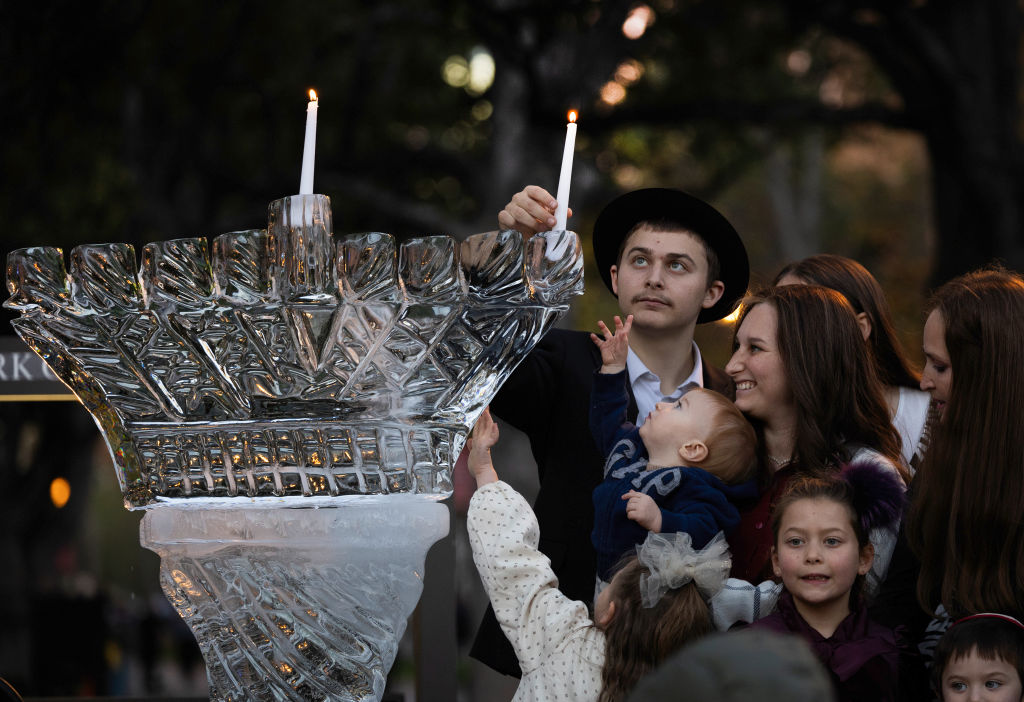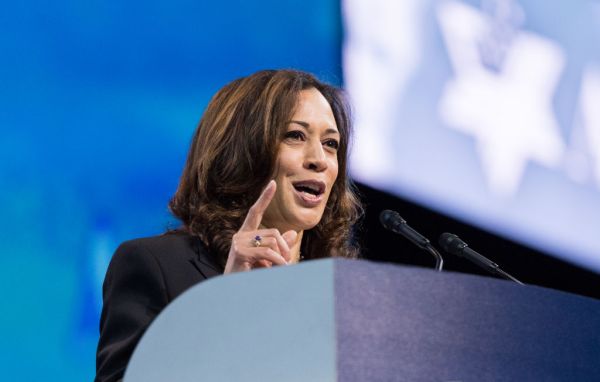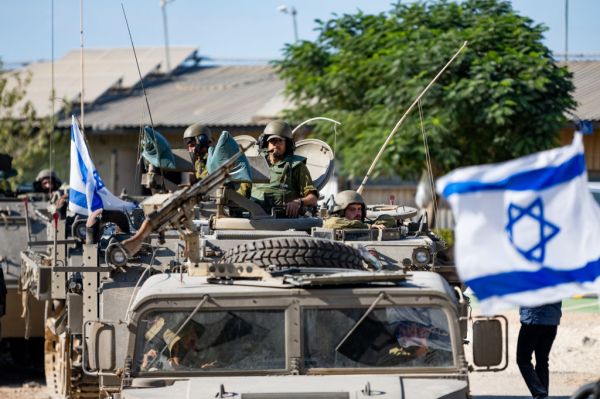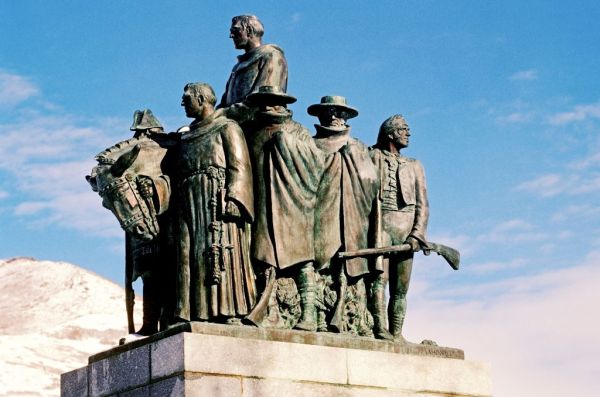On the first night of Hanukkah last week, I attended a candle lighting celebration at Stanford University, my alma mater. The public event seemed muted this year: fewer people in the crowd, fewer children, and less energy. Even the ice menorah looked smaller (I first thought this a trick of the mind, but the rabbi confirmed it). I was surprised. I’d expected a bigger crowd than usual—and a defiant sort of energy—both because the event was held in a plaza simultaneously occupied by a pro-Palestine sit-in, and because it came on the heels of the viral congressional testimony from the presidents of Harvard, MIT, and Penn.
When I got home, a little deflated, I called my parents, who emigrated to Jerusalem in 2019.
“So what’s the vibe there?” I asked. “Because here it’s a little depressing.”
My father, who after four years living in Israel is something of a propagandist for the Zionist way of life, told me it was “very freylekh” (a Yiddish word meaning merry or joyous). “We’re going about our lives,” he said. “People are having parties. Events are still happening in the city.” He informed me that a large indoor amusement park for kids, Magic Kass—which he likes to say quickly and as one word—is up and running.
My mother, who generally has a more realist take, said the celebrations were notably muted, the streets emptier. She’d tried making dinner reservations at a popular restaurant but was told that it was closed “due to the situation,” which is the classy, understated way Israelis’ refer to the fact that their country is at war. But she also said that people seemed determined to celebrate no matter what. “The soldiers fighting in Gaza are our modern-day Maccabees,” she told me, referring to the Jewish warrior heroes of the Hanukkah story.
Living in America, I often feel like I’m living in the minor plotline of the Jewish story, especially around this time of year, when my husband and I dutifully set out menorahs in our window, light the holiday candles, then go about our regular business. This year, that feeling has been amplified by my physical distance from Israel and the war it’s fighting for its security and for the return of some 130 hostages still held captive in Gaza.
And yet, despite this disconnect, I think the Hanukkah story speaks to American Jews right now—and America as a whole—far more than it speaks even to Israel.
Hanukkah commemorates a) the victories of the small Maccabean force against a mighty, religiously repressive Seleucids and b) the rededication of the Second Temple in Jerusalem in 164 BCE. From a religious point of view, it’s a pretty minor holiday. Its popularity in America is more reflective of the holiday’s convenient proximity to Christmas than its spiritual centrality.
But in Israel, the minor Jewish holiday has become a major festival. Early Zionists claimed Hanukkah for their own, emphasizing the military victory and the Maccabean model of taking the Jewish destiny into their own hands. In a normal year, at least, to walk the streets of Jerusalem on Hanukkah is to feel a distinct holiday spirit. Schools are closed. Holiday music plays. Shops sell doughnuts in flavors like “Banana Coffee-Toffee” and “Pavlova Cream Cheese.” There are concerts, crafts activities for children, and, of course, Magic Kass. (My grandmother, who emigrated just last year to Israel, reports that based on the lines she saw at the mall, Israelis’ demand for artisanal doughnuts remains strong.)
The Hanukkah story is a notoriously flexible one. But critical to most any version is the fact that the Maccabees weren’t fighting to defend their lives, but their religious beliefs, their distinct and particular Jewish identity. This is what makes the battle different from so many fought in Jewish history (like, for example, the Purim story, in which the Jews squared off against the genocidal Haman). Jews living under Seleucid rule were permitted to live and be part of the society, but there was a cost: They had to cut themselves off from their traditions, profaning the Sabbath, worshiping false gods, leaving their sons uncircumcised.
There’s something eerily familiar about this form of antisemitism. One can imagine the Seleucids saying: We have no problem with you being Jewish, you can be part of our culture, we just need you to denounce your people, their traditions, and the homeland they’ve prayed to return to for millenia.
As many have noted in recent weeks, antisemitism in America is a symptom of a greater societal illness. That doesn’t mean we shouldn’t read instances of it plainly as what it is: Jew hatred. When pro-Palestinian protesters mobbed a Jewish-owned restaurant in Philadelphia this month, charging the establishment with “genocide,” that was Jew hatred. When assaults on visibly religious Jews are underreported or ignored by the media and the public, that’s Jew hatred. When colleges and universities coddle “oppressed” students while condoning blatant expressions of antisemitism, that’s Jew hatred. But these expressions of hatred are also symptoms of a society that’s caught in the middle of a crisis of values, caught between liberal ideals (and the true tolerance they demand) and progressive ideology, which promises a culture not just of tolerance, but acceptance, and yet in truth offers neither.
A central ritual of Hanukkah, from a religious perspective, is the lighting of the menorah. The Jewish sages teach that the menorah should be lit at the outside entrance of one’s house, or in a window. Why? So that all who pass by can see it. In other words, we publicize the miracles of Hanukkah because the Jewish story has a lesson for the wider world. The menorah prods those who see it, Jews and non-Jews alike, to reclaim our values and rededicate ourselves to the principles that sustain us as a people.
My hope, this holiday season, is that America is ready to embrace the message.








Please note that we at The Dispatch hold ourselves, our work, and our commenters to a higher standard than other places on the internet. We welcome comments that foster genuine debate or discussion—including comments critical of us or our work—but responses that include ad hominem attacks on fellow Dispatch members or are intended to stoke fear and anger may be moderated.